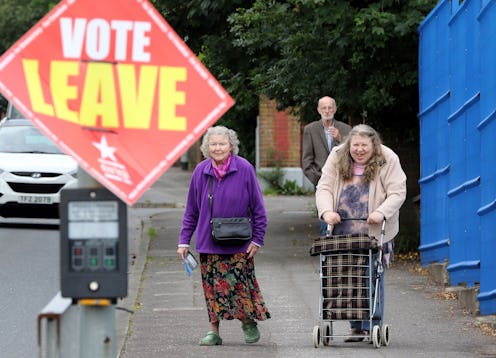News
A Leave Vote Would Be Just The Beginning
Emotions over the United Kingdom's future in the European Union have been high throughout the recent "Brexit" campaign, with tense discussions over immigration, free trade, and political sovereignty. And no matter how the millions of U.K. citizens who participate in the referendum vote, the future remains far from certain. Because if Britain votes to exit the EU, it won't be simple or quick to actually leave.
That's because there's no precedent for such a vote. No European member nation has voted to leave the economic and political union since its formation in 1992, and the same is true of its predecessor institutions which formed following World War II, first as the European Coal and Steel Community in 1952 (unless you count Greenland, which used to belong as a part of Denmark). Thus, the prospect of the United Kingdom attempting divorce is seen with a lot of uncertainty, especially because the Eurosceptics pushing the Brexit want time to negotiate good terms for leaving. The Financial Times reported that any possible exit could take until 2019 to complete.
Technically, what must happen is quite simple. The prime minister would need to write a letter to the president of the European Council notifying him of the intention to leave. The European Council would then appoint a negotiator in charge of mediation. Here's where it gets complicated. The United Kingdom would want to maintain a lot of the preferential treatment that they currently get due to EU membership — for example, access to the EU's single market, the largest free trade area in the world. But the EU may want to make an example of the U.K. in order to dissuade other members from following in its path. Negotiations would take about two years, and then both the U.K. and EU parliaments would have to ratify the deal.
The negotiations could be particularly tricky. The "Leave" campaign has been very vague as to what the future outside of Europe might look like. Much of the consternation with the EU in Britain comes from the freedom of movement requirement, specifically the free movement of people. Immigration has increased in recent years, and the Conservative government has made efforts to limit it, largely to no avail. Thus, Brexitors would try to ax the U.K.'s signing of the freedom-of-movement principle, which guarantees EU citizens the right to live and work in Britain. But that would, in theory, keep the U.K. out of the single market.
Upon exiting — which, again, may not happen for several years — there are several possible scenarios for what Britain and its economy would look like. Much will depend on trade agreements. On top of the single market, Britain, through the EU, has free trade deals in place with 52 other countries. Those would all have to be renegotiated. Agreements with Canada and the United States are far from certain. President Obama said that Britain would go to the "back of the queue" for a free trade agreement if they leave the EU.
The British economy could shrink by as much as 7.5 percent by 2030 if the country votes to leave. Financial firms in London have threatened to move to European offices if the U.K. leaves. And the biggest issue of the whole campaign, immigration, would likely remain unchanged. If the U.K. remained in the single market, EU workers could still come. If the U.K. opted for a points-style immigration system, highly educated workers from around the world could take their place. Either way, reducing it to sought-out levels would be extremely difficult.
Therefore, no matter who wins the referendum, few Britons are likely to be pleased with the immediate aftermath of a "leave" vote. Stay tuned and see.
